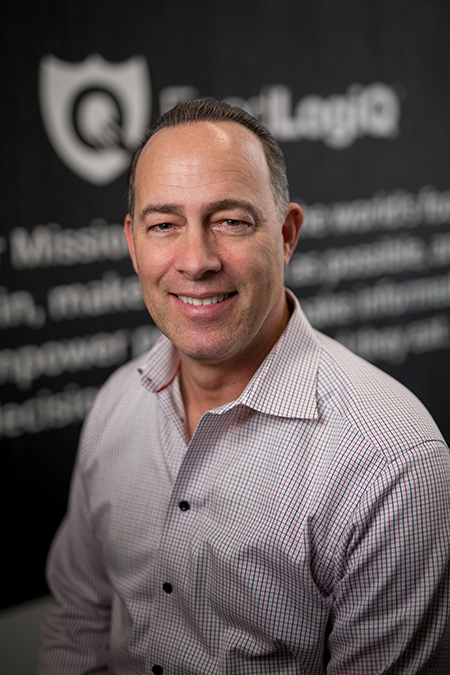During the past year, the headlines have been filled with stories of foodborne illness, product recalls, and consumers becoming sick from tainted food. In a Q&A with Food Safety Tech, Sean O’Leary, CEO at FoodLogiQ, talks food safety, traceability, and how small percentages can translate into big victories for the food industry and for the people they serve.
Food Safety Tech: From your perspective, what is the current sentiment of consumers with regard to food safety?
Sean O’Leary: Over the last few years, the consumer mindset has changed about food in general. We’ve watched fad diets come and go; however, the interest in healthy ingredients and the concern about where food comes from has graduated from a passing trend to a full shift into the public consciousness. Consumers are much more discerning about what they eat; they also demand to know where their food comes from, how it was produced, and how it got to their table. We are living in the age of transparency, and consumer expectations are high.
And who can blame them? CDC statistics tell us that approximately 48 million people get sick every year from foodborne illnesses—and that’s just in the United States; 128,000 of them end up in the hospital. When a person is admitted to the hospital, it affects more than just that one individual. If the patient is the sole breadwinner of their family, their illness affects the entire family. If the person who gets sick is a child, there can be long-term consequences that trickle down to his or her whole community. And when you consider that 3,000 people die every year from foodborne illness—that’s one 9/11 every year. That’s unacceptable, because this is a preventable issue, and unfortunately, these illnesses are an underreported public health problem.
My challenge to the food industry is simple: What if we made just a 1% improvement in the number of cases of foodborne illness? That seems like such a small percentage, but when you do that math, that’s 480,000 people who don’t get sick this year; 1,280 people who aren’t admitted to the hospital; and 30 people who don’t die. Those are significant numbers.

FST: To help shed additional light on this subject, FoodLogiQ conducted a national survey to tap into how U.S. consumers feel about issues related to food transparency. What did you learn from those consumer responses?
O’Leary: We polled more than 2,000 people to gauge their sentiment around food traceability and their expectations for food companies regarding foodborne illness and product recalls. The survey also posed questions around consumer preferences regarding their food sources and how they are identified on food labels and menus. The results were enlightening, to say the least.
We learned that a brand or restaurant will pay a high price in terms of customer loyalty if they experience a food recall due to consumer illness. And those customers have some strong opinions regarding how quickly the brand or restaurant should address a food safety issue.
- 35% of survey respondents told us they would avoid an affected brand or restaurant for a few months, and maybe they would return after the issue had been resolved. Meanwhile, nearly 25% admitted they would never use the brand or visit the restaurant again.
- Of the respondents who say they care about the quality of the food they eat, 55% say they expect a recall to be executed within 24 to 48 hours.
In reality, it sometimes takes weeks for a product to be pulled from the store or restaurant. This is frequently due to communication issues, since everyone along the supply chain—the grower, supplier, packing and distribution centers, corporate office, and the retailer or restaurant—all must be notified, and a recall plan must be set in motion. Unfortunately, that communication process takes time. When that communication takes place via email or by phone call, the people responsible for pulling product may not have the information they need or may have received misinformation. This can result in lag time, and potentially unsafe product can still get into the hands of consumers.
The faster a food company can address a recall situation and return to business as usual, the faster customers will come back. But comprehensive supply chain transparency is needed to be able to make swift, accurate decisions during this time of crisis. By having a robust end-to-end traceability program and technology that provides real-time data and visibility, companies facing a recall can isolate and surgically withdraw the tainted product out of the supply chain without recalling more items than necessary. That limits the disruption and the waste of good food, which saves the company money.
FST: You recently attended the FDA’s “A New Era of Smarter Food Safety” public meeting in Maryland. What do you think this new campaign will mean for the food industry?
O’Leary: FoodLogiQ was honored to have the opportunity to share our intricate knowledge of the food supply chain, as well as best practices regarding whole chain traceability during this monumental meeting with the FDA with more than 250 food industry leaders.
In retrospect, one thing is clear—we’re in the midst of a pivotal time of change for the world’s food supply chain. In the United States, the food industry remained status quo for decades, but the introduction of FSMA has brought increased scrutiny and accountability; I think it’s made every food company pause and evaluate where they are with regard to food safety, and that’s a good thing. And now, with the launch of the “New Era” campaign, we’re coming together in a collaborative fashion to map out how technology tools, prevention measures, new business models, and an evolving culture of food safety can be merged as a framework for a long term food safety solution. I agree with the FDA; ‘Smarter Food Safety’ is people-led, FSMA-based, and technology-enabled. It will take all of us working together to reach that goal.




